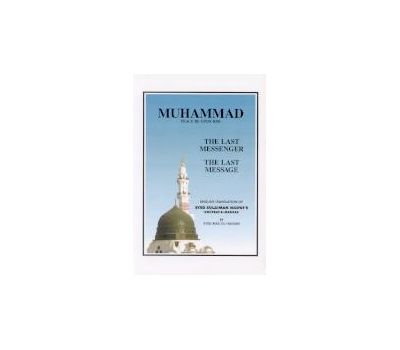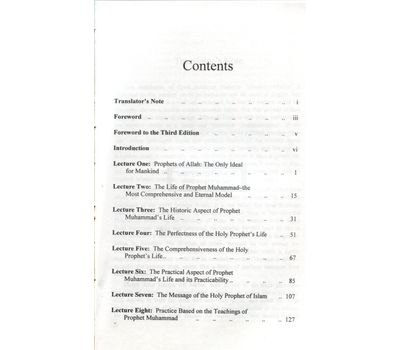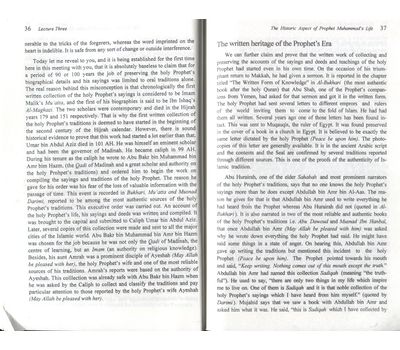Translator’s Note
This translation of Syed Sulaiman Nadwi’s “Khutbat-e-Madras” is dedicated to the western world in particular and all users of English language in general. It is a well acknowledged fact that the western world has generally shown a hostile attitude towards Islam. But that attitude is now showing visible signs of change. Although Islam is still being portrayed by the western media as a threat and “extremist fundamentalism”, in the words of the of the Reader’s Digest it is “the world’s fastest growing religion.” Many prominent social and political leaders of the western world have begun to admit the importance of Islam for humanity and that there is a need to study it impartially and objectively in order to have a greater understanding of Islam and the Muslim world. At this point, it would be logical to say that a proper understanding of Islam can come only through original Islamic sources.
As the readers of this book will notice, an immense amount of literature about the Prophet of Islam, Sall-Allahu alayhi wa sallam, (Peace be upon him) is available in different languages of the world besides Arabic. It is our belief that Syed Sulaiman Nadwi’s “Khutbat-e-Madras” is, perhaps, the best book to introduce the Prophet of Islam and the message of Islam to the western world. When Syed Sulaiman Nadwi was preparing the material for this book he had in mind basically a non-Arab, non-Muslim audience. He was in a unique position to introduce the Prophet of Islam, because he had already coauthored a seven-volume biography of the holy Prophet, Sall-Allahu alayhi wa sallam, which is highly regarded in the Muslim world for its scholarly merits. Compared to this biography the present book seems like a bottle of perfume extracted from tons of flowers.
Sheikh Abul Hassan Ali Nadwi, who is one of the most prominent scholars of Islam at the present time, a teacher, an author and a historian, well known in both the Arab and non-Arab world, says about this book that it is a miracle of scholarship. It was a rare good fortune of this translator to meet Sheikh Abul Hassan Ali Nadwi (who was passing through Al-Khobar on his way back from Makkah) and show this translation to him for his approval. He wrote a very gracious letter from India with his appreciation and comments, some of which might be relevant here:
“…Syed Sulaiman Nadwi‘s ‘Khutbat-e-Madras’ holds a unique position in the literature about the holy Prophet, Sall-Allahu alayhi wa sallam, (Peace be upon him). Without lessening the importance of this valuable treasure which has been produced over the last fourteen centuries, I would like to say that the present world needs a series of articles to explain the universal nature of the message which the holy Prophet’s biography extends to all mankind, particularly its relevance to the complexities of the ever-advancing modern life. It is the need of time that Syed Sulaiman Nadwi ‘s great book should be translated into different languages so that its benefit should reach the whole world I congratulate you for translating it into English. I pray to Almighty Allah for the success of your effort with the hope that it may kindle the light of faith all over the world.. “[Abul Hassan Ali Nadwi, Lucknow, India, 24 May, 1996].”
In conclusion, I would like to say that Islam, which literally means peace, guarantees a life of peace and prosperity in this temporary world and a life of everlasting peace and joy in the next world. It is a message from Allah, the Creator of man, to man for his eternal success. We hope and pray that Almighty Allah, Most Gracious and Merciful, make this book a means towards understanding this message and grant us His Pleasure and Mercy in this life and the hereafter.
Syed Riazul Hassan
Dammam, Saudi Arabia
30th July, 1996
Foreword
The following few lectures about different aspects of the life of the Prophet of Islam, Sall-Allahu alayhi wa sallam, (Peace be upon him) were delivered under the patronage of the Muslim Educational Society of Madras, India, in 1925. For the past few years, it has been a regular practice in Madras that every year some distinguished scholar of Christianity gives lectures on Christianity and Jesus Christ (Peace be upon him), which are received with great interest. This gave the idea to certain well educated Muslims of Madras that a similar attempt should be made for the benefit of the Muslim students of English-medium schools there. Every year, the services of a Muslim scholar should be acquired to give lectures about Islam and the Prophet of Islam, Sall-Allahu alayhi wa sallam, (Peace be upon him), and these lectures should suit the taste of the students of English-medium schools and appeal to the modern mind. Fortunately, Seth M. Jamal Mohammad took upon himself to sponsor these lectures and it is hoped that his good work will continue for a long time to come and this series of the “Islamic Lectures of Madras” will be popular and fruitful.
I feel privileged that I was the first to be chosen for this noble and extremely important task. Eight lectures were held at Laly Hall, Madras, beginning in October, 1925, and were completed in the last week of November. I am grateful to Seth Hameed Hassan, Secretary of the Muslim Education Society, who made all the arrangements, including the announcements and the English translation of these lectures. I am also grateful to the Muslims of Madras for their patient hearing and appreciation of the lectures some of which lasted for nearly three hours. The non-Muslims too, deserve my thanks who in their search for truth attended these meetings despite the fact that Urdu is not their native language.
I extend my gratitude to the Urdu and English newspapers of Madras for publishing weekly a summary of my lectures in their columns. Daily Express and The Hindu of Madras deserve a special mention in this regard who generously devoted their columns for the English translation of these lectures.
Finally, while I present these lectures in the written form, I bow my head in humble gratitude to Almighty Allah, asking for His acceptance and Mercy and that He may grant me the sincerity of purpose in presenting this work to the readers.
Seeking Allah’s Mercy,
Syed Sulaiman Nadwi
Desna, Bihar
December, 1925
SAMPLE PAGE 1
from Lecture One: Prophets of Allah: The Only Ideals for Mankind
The life around us is full of all kinds of wonders. Scattered in the world are different creatures with distinct qualities and characteristics. A close look at Allah’s creation shows that from inanimate things to the human beings there has been a gradual progress of sense, perception and will. The basic forms of inorganic matter show a complete lack of sense and perception. Some other kinds of material show a faint trace of some kind of life. In growing plants involuntary presence of senses can be felt. In the animal world along with the senses there is some kind of will. In human beings, the power to control their thoughts, actions and desires makes them the most responsible of all created beings. The degree of responsibility in other creatures is proportional to the degree of free will given to them. The inorganic things are entirely free from all responsibility. Plants are subject to the laws of life and death. In the animal world, the responsibilities are increased further but it is mankind that is bound by obligations all over. Within their own kind, the mentally ill, the idiots and children on the one side and the adults, the learned, and the intellectuals on the other have to bear the burden of responsibility according to the power of perception and will present in them.
Look at it from another perspective. Allah’s power of creation and sustenance takes care of all the needs of the created beings but gradually the burden of responsibility is put on the creature itself as it develops its own sense and will power. Who creates and nurtures the precious jewels in the hearts of the mountains? Who rears the fish in the depth of oceans? Who looks after the beasts of the jungle? Who cares about the animals in the cold of winter and the heat of summer and heals their sick? You will notice an apparent difference in the paws, the hair and the colour of their skin and their looks even among the same species of animals depending on the difference in their habitat. The needs of the dog of Europe and that of Africa are different and nature provides for them from its own resources. For example, the European dog’s coat is woollier and thicker than the African’s. These are some of the various ways how nature provides for their different needs and they also show how it compensates and covers up wherever there is a weakness of sense and will power. And in Allah’s creatures who are given this power in a greater degree and when they reach a stronger and maturer state, nature automatically withdraws itself and leaves them free to look after their needs themselves. For example, man has to work for his living which is not provided to him directly. He has to bear the burden of cultivation; he has to plant and grow his own food. He is not born with a woolly skin for protection against a severe winter. He has to make his own clothes. He has to find his own cure for his illnesses and he has to nurse his own wounds.
SAMPLE PAGE 2
from Lecture Five: The Comprehensiveness of the Holy Prophet's Life
Prophet Muhammad’s personality displays miraculously balanced emotions found in a human being in a wide variety of situations. If you are wealthy, follow the example of the noble trader of Makkah and trustworthy custodian of the treasures of Bahrain. If you are poor, look at his example when he was confined to a place called Shi ‘b Abi Taleb outside Makkah for three years where even the bare necessities of life were denied to him and his children, or when he was forced to leave his hometown and emigrate to Madinah. If you are a king, learn about him when he became the absolute ruler of Arabia. If you are the ruled, look how he endured the oppression of Qureish in Makkah. If you are a victor, look at the commander of the battles of Badr and Hunayn. If you are a loser learn your lessons from the battle of Uhad. If you are a teacher look at the noble teacher of Suffah (in his mosque in Madinah). If you are a student, look at the student receiving Allah’s Message from Gabriel. If you are a preacher, listen to the preacher of Madinah delivering his sermons in his mosque. If you have to raise the voice of truth against the evil powers of oppression, look at the lonely and helpless messenger of Allah conveying His message in Makkah. If you have, with Allah’s help, overcome your opponents and your enemies, watch the conqueror of Makkah in triumph. If you want to organize your business or worldly affairs, look at the administration of the owner of the lands of Bani Nudhair, Khyber and Fadak. If you are an orphan, look at the upbringing of the orphan child of Amenah and Abdullah. If you are a boy watch him grow under the loving gaze of Halimah Sa’diyah (May Allah be pleased with her). If you are an adolescent, study the character of the shepherd of Makkah. If you are a traveling tradesman, look at the examples set by the caravan leader of Basrah. If you are an arbitrator or a judge in a court of law, imagine him entering the holy Mosque of Makkah at dawn and settling the dispute among the blood-thirsty rival tribesman of Makkah, and preventing bloodshed in the holy House of God with his wise judgment. And watch the judge sitting in the courtyard of his mud-brick Mosque of Madinah, handing out impartial judgment in the cases of the high or the low, the rich or the poor with equal fairness.
If you are a husband, study the pure and faithful life of the noble husband of Khadijah and Ayeshah (May Allah be pleased with them). If you have children, look at Fatimah’s father’s upbringing of her and her sons Hassan and Hussain (May Allah be pleased with them). Whoever you are and whatever your circumstance, if you are looking for guidance, correctness of conduct and the bliss of life, you will always find it in the shining example of Allah’s last Prophet, Muhammad (Peace be upon him). Whoever wants to shun the darkness of ignorance and prejudice and is looking for the light of truth and guidance, they will find it in the immaculate and perfect life of the holy Prophet whose divinely guided and inspired life is the only source of salvation for mankind. One who has some understanding of the holy Prophet’s biography will feel that the lives of the other great prophets of Allah like Noah, Abraham, Job, Jonah, Moses and Christ (Peace be upon them all) are combined into one, represented in the holy Prophet’s life. The sublime examples of the nobility of the human character and morals that distinguish each messenger of Allah individually are found in the holy Prophet’s life collectively, for all those who seek truth and guidance from his life.
Lecture One: Prophets of Allah: The Only Ideal for Mankind
Lecture Two: The Life of Prophet Muhammad—the Most Comprehensive and Eternal Model
Lecture Three: The Historic Aspect of Prophet Muhammad’s Life
Lecture Four: The Perfectness of the Holy Prophet’s Life
Lecture Five: The Comprehensiveness of the Holy Prophet’s Life.
Lecture Six: The Practical Aspect of Prophet Muhammad’s Life and its Practicability.
Lecture Seven: The Message of the Holy Prophet of Islam
Lecture Eight: Practice Based on the Teachings of Prophet Muhammad
Books
- English
No posts found






